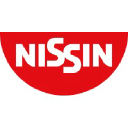🚀 Sign up Free for Public Company Valuation & Insights!
Sign up for free to get access to the best public company valuation and insights. Get started today and unlock the potential of your investments!
Sign up free Video Highlights
Nissin Foods
-0.52%
Food & nutrition / Food manufacturing
At a Glance | Core Facts | Company | Industry | Competitors | Stock Swings | News | Income | Balance | Cash Flow | Growth | Enterprise | Ratios | Metrics | Dividends | Risks | SWOT | Porter's Five Forces | PEST | Score Positive | Clusters | Reports | WebNissin Foods is a food company based in Japan that specializes in the production and distribution of instant noodles and other convenience food products. The company was founded in 1948 by Momofuku Ando and has since then become a global brand with a presence in over 80 countries.
Political Factors:
1. Government regulations: Nissin Foods operates in many countries, and each has its own set of food regulations that the company needs to comply with. This can create challenges for the company in terms of production, labeling, and marketing of their products.
2. Trade barriers: Nissin Foods relies heavily on international trade for its global presence. Any trade barriers such as tariffs or import restrictions imposed by countries could impact the company’s profitability.
3. Political stability: Any political instability in countries where the company operates could affect its operations and supply chain, leading to disruptions in the production and distribution of its products.
Economic Factors:
1. Global economic conditions: The global economic conditions, such as inflation, interest rates, and exchange rates, can have a significant impact on Nissin Foods’ profitability, as it directly affects their costs, sales, and profits.
2. Consumer spending: The demand for convenience foods is closely tied to consumers’ disposable income and spending patterns. In times of economic slowdown, consumers may switch to more affordable food options, which could impact the sales of Nissin Foods products.
Social Factors:
1. Changing consumer preferences: With the growing trend of healthy and natural foods, consumers are becoming more health-conscious and are demanding healthier options. This could pose a challenge for Nissin Foods, which primarily produces convenience food products.
2. Demographic changes: The company needs to adapt to changing demographics, such as an aging population and increasing numbers of single-person households, to effectively target and cater to these segments.
Technological Factors:
1. Advancements in technology: Technological developments in food production and packaging can present opportunities for Nissin Foods to improve efficiency and reduce costs.
2. Social media and digital marketing: With the rise of social media and e-commerce, Nissin Foods can leverage digital marketing to reach a wider audience and increase brand awareness.
Environmental Factors:
1. Sustainable sourcing: With growing concerns about environmental sustainability, Nissin Foods may face pressure to ensure the sustainable sourcing of its ingredients and reduce its carbon footprint.
2. Waste management: The production and consumption of convenience foods generate a significant amount of waste. Nissin Foods may need to implement efficient waste management practices to reduce its impact on the environment.
Legal Factors:
1. Product safety regulations: Food safety regulations are becoming increasingly strict, and Nissin Foods must ensure that its products meet the required standards to maintain consumer trust and avoid legal issues.
2. Intellectual property rights: Nissin Foods invests heavily in research and development to create new and innovative products. The company must protect its intellectual property by securing patents and trademarks to prevent competitors from copying their products.
Wait! There might be more — sign up free or log in